Country Profiles
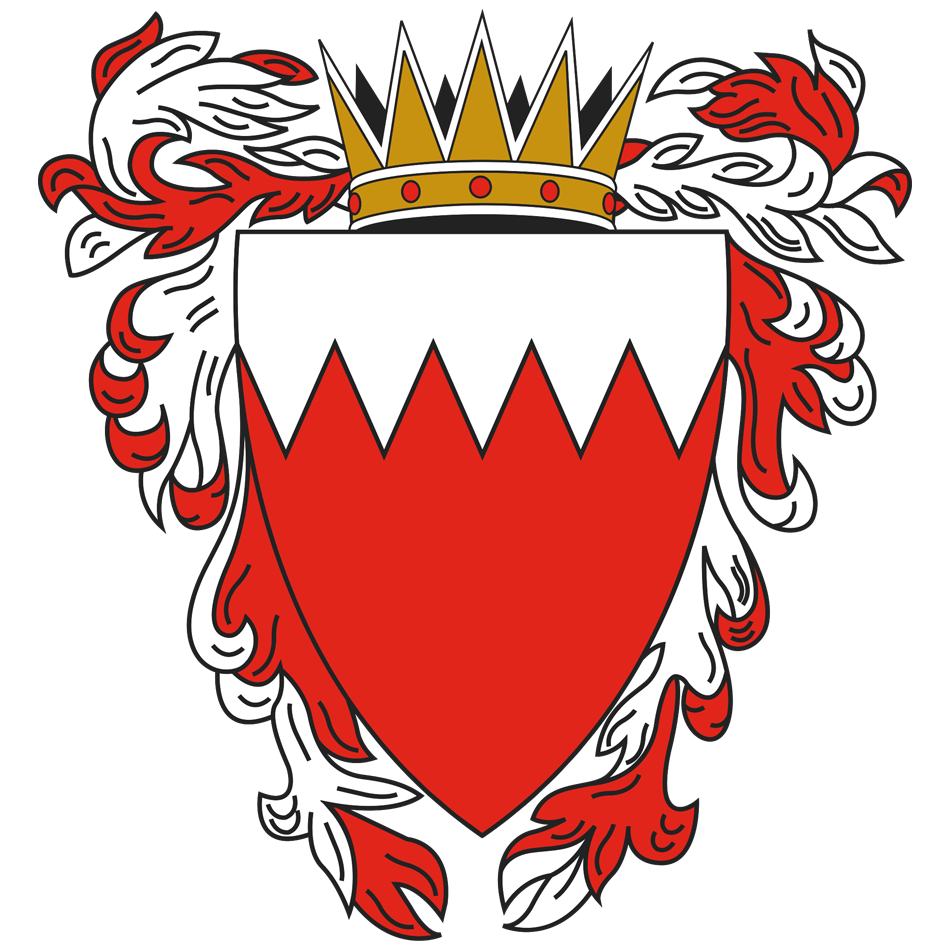 |
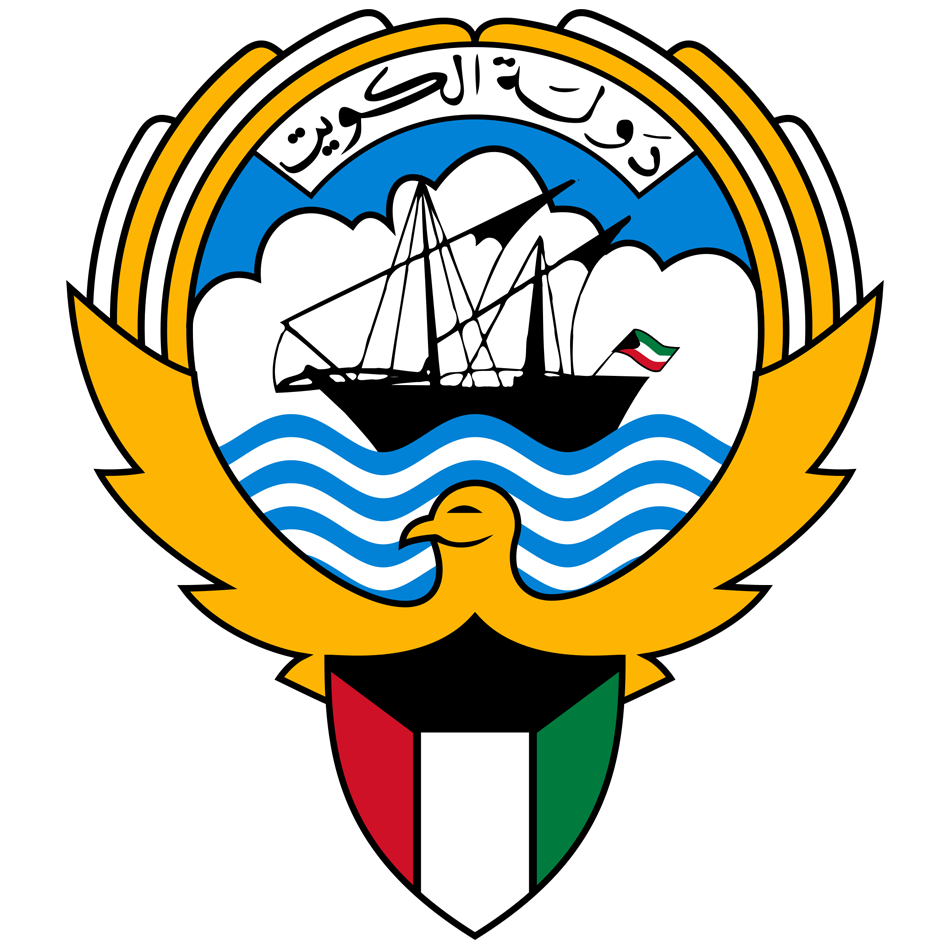 |
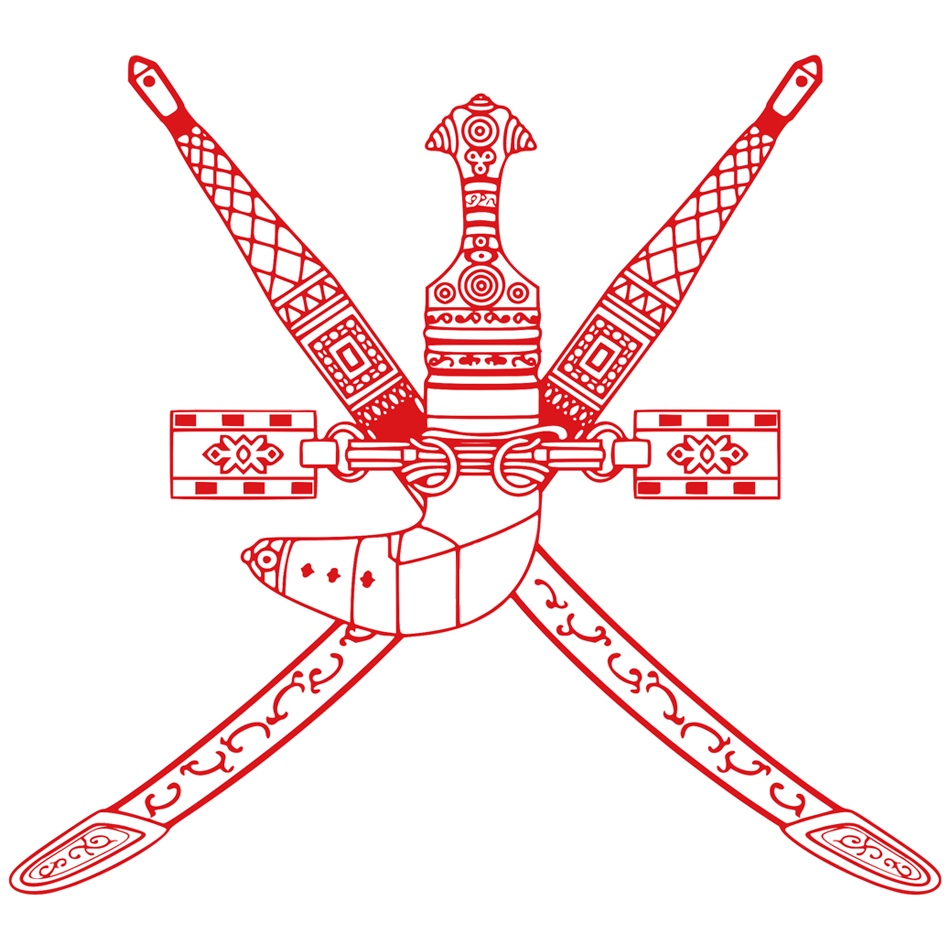 |
 |
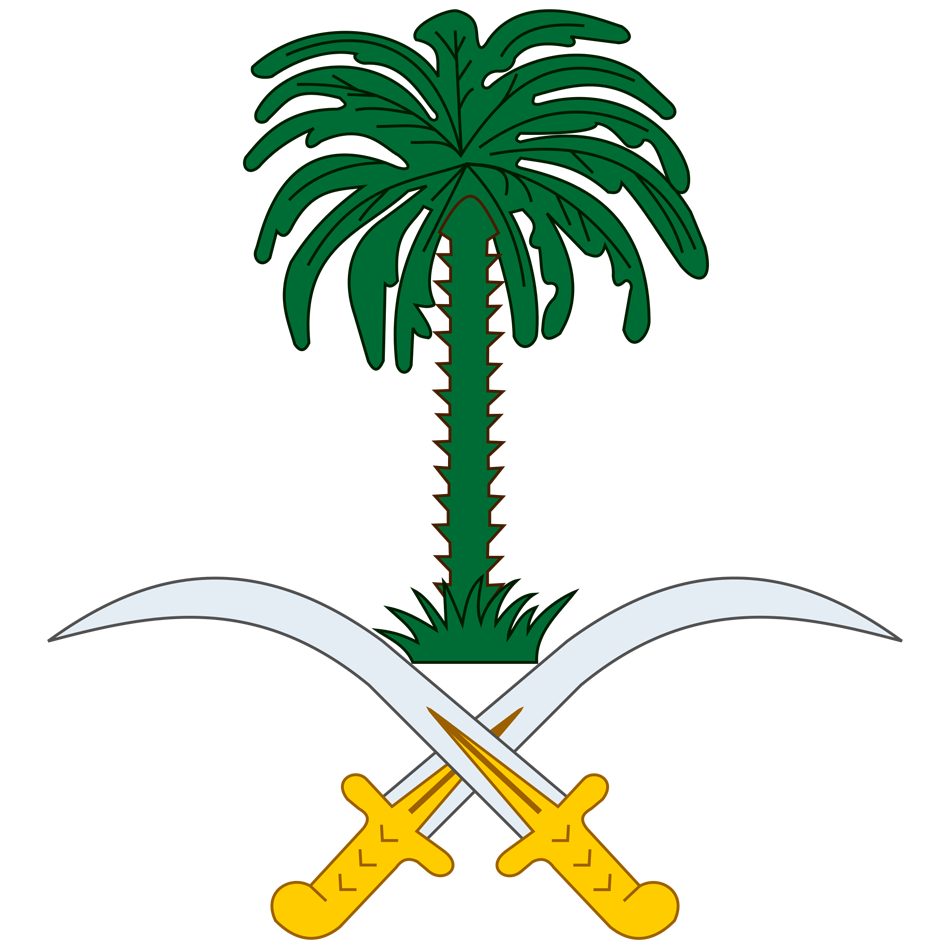 |
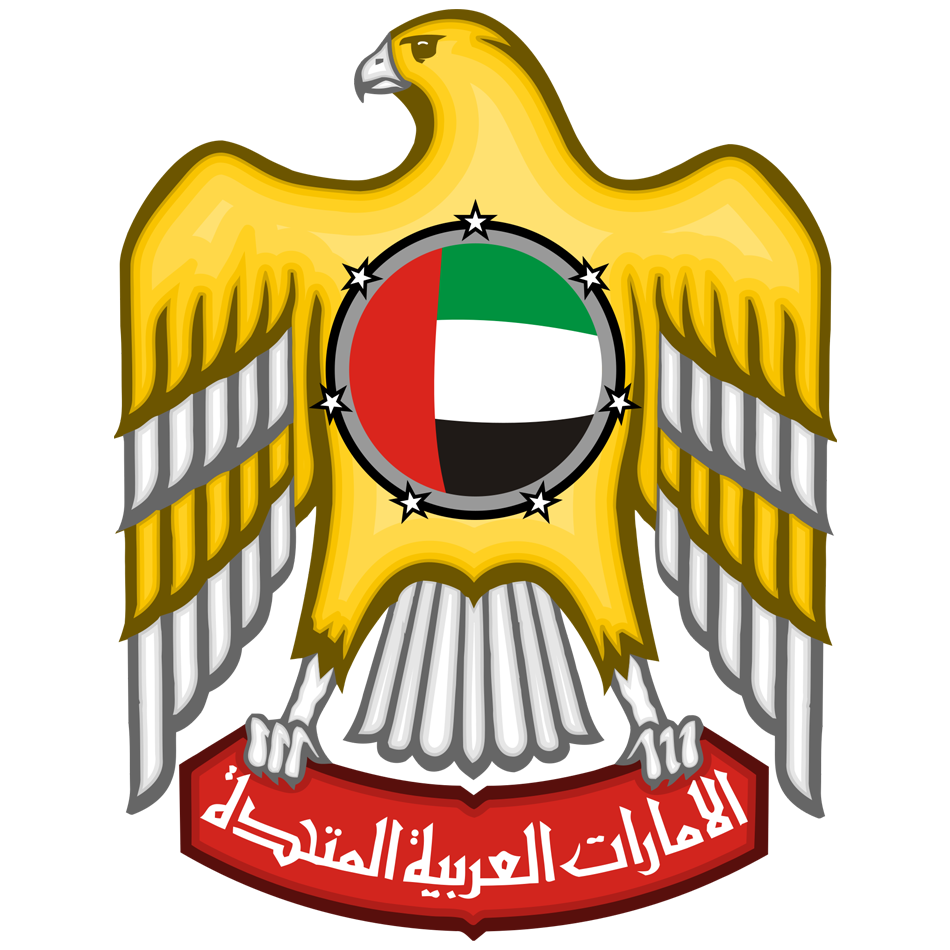 |
Qatar
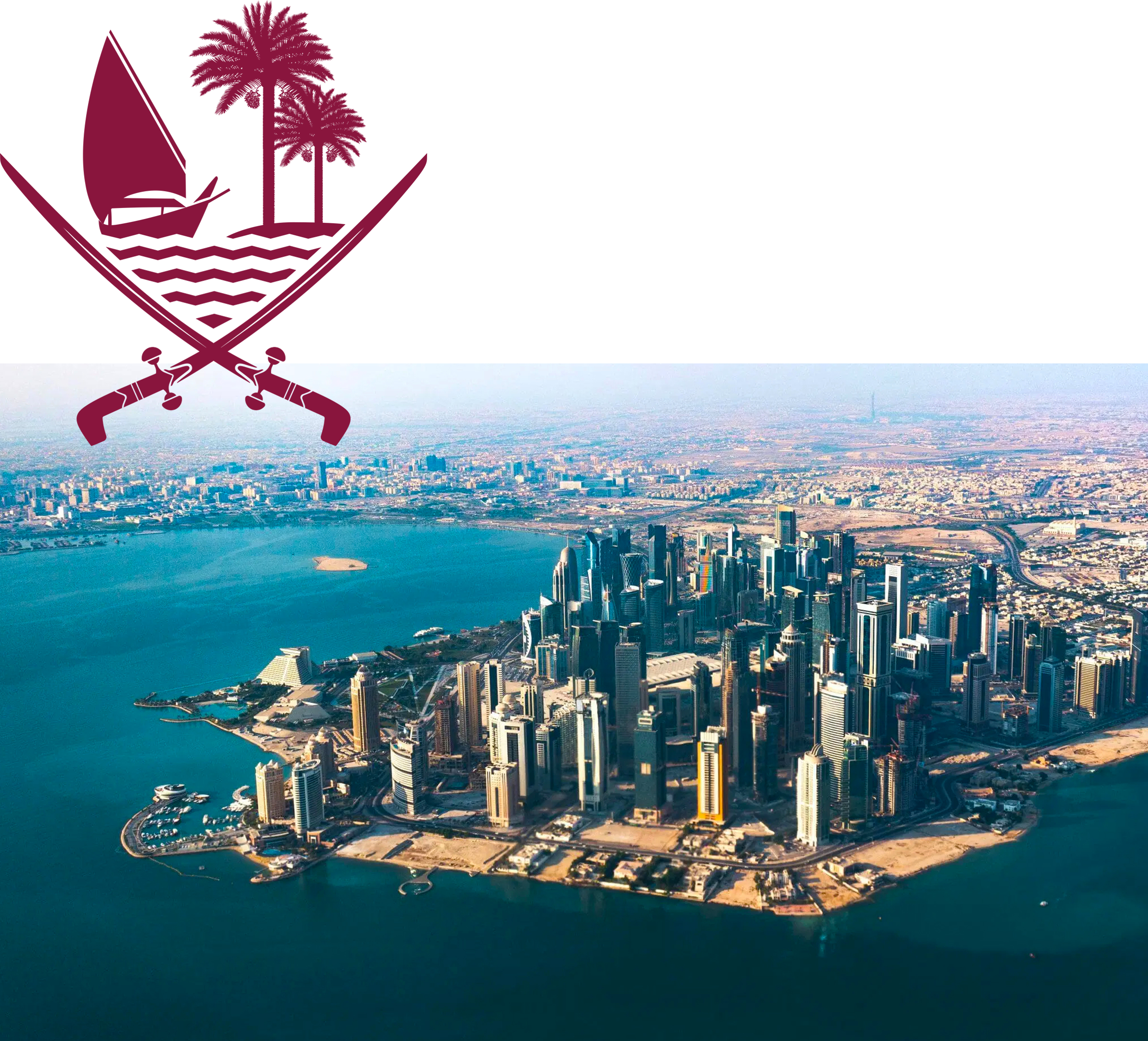
Qatar is a peninsula on the northeastern coast of the Arabian Peninsula; it shares its sole land border with Saudi Arabia to the south. The capital is Doha, home to over 80 per cent of the country’s inhabitants. Qatar has one of the highest levels of GDP per head in the world, and the highest in the GCC.
Maps & Flag
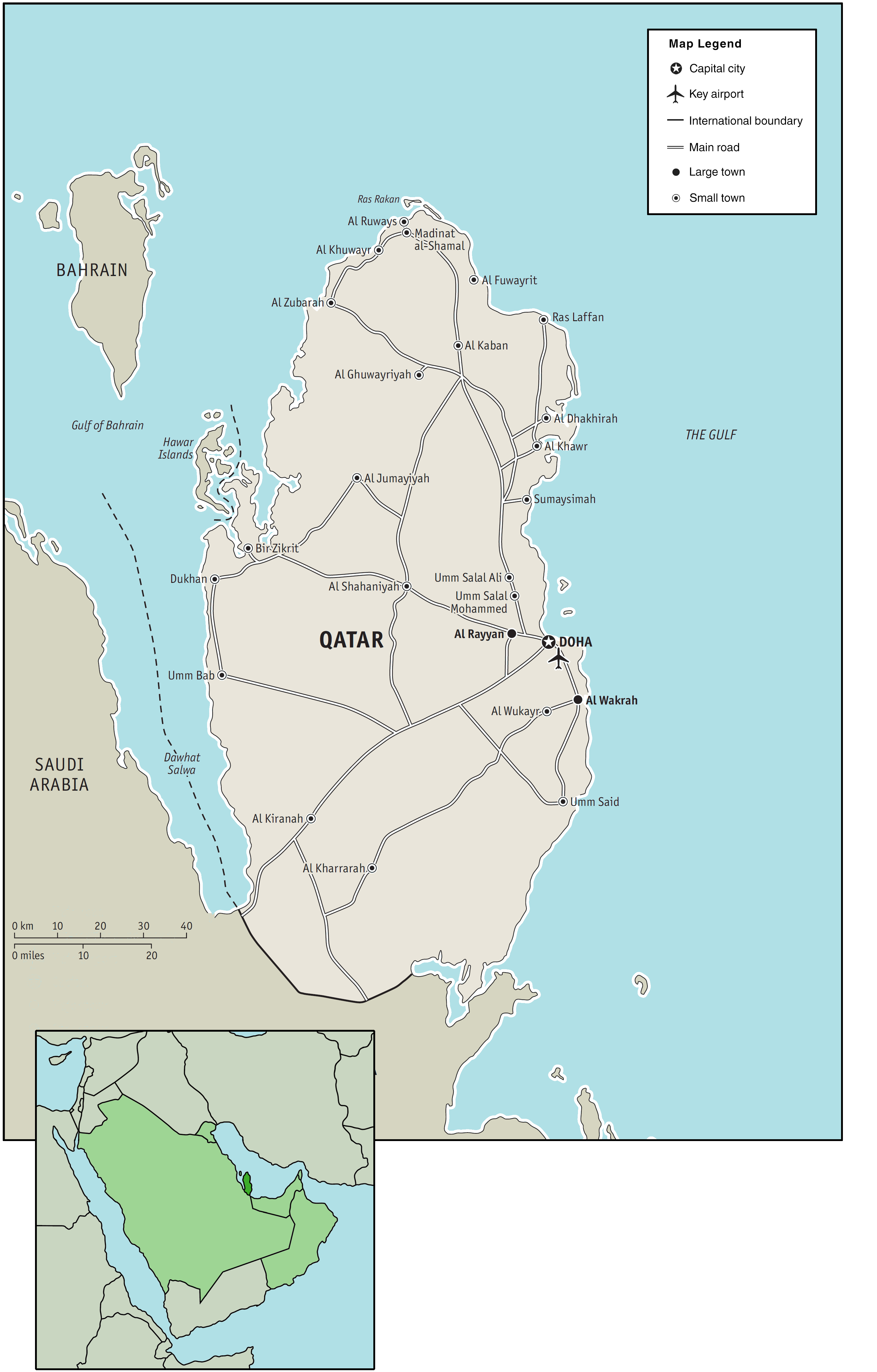
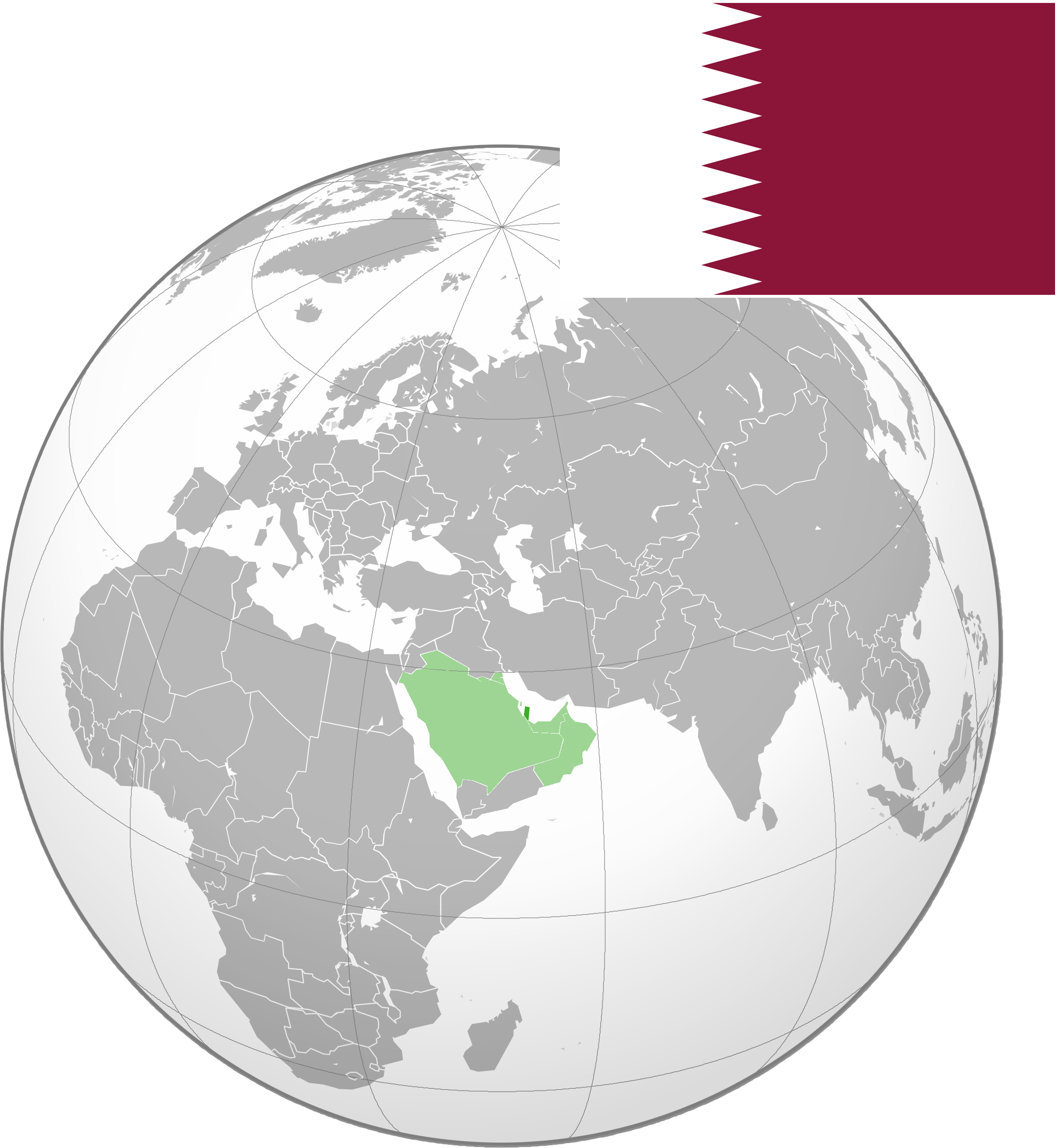
The population of Qatar was 2.8 million in early 2025, although only 348,000 of these individuals are Qatari. Analysts note that Qataris are provided with a wide range of social welfare benefits by the government, including free healthcare, education and subsidised housing. And suggest that because if this, Qataris nationals seem, on the whole, to be content, despite having little influence over politics, due to the generosity of the ruling elites (social welfare benefits in this small country are incredibly generous by any metric).
Introduction
A rapidly expanding non-hydrocarbons sector underscores Qatar’s commitment to long-term economic diversification, supported by the Third National Development Strategy (NDS3) launched in January 2024 to accelerate progress toward Qatar National Vision 2030 (World Bank, 2024). [1] Qatar is prioritising the information technology sector, targeting a 50 per cent growth by 2024, supported by near comprehensive broadband and 5G coverage. The imminent launch of the National Health Strategy 2024-2030 will further reinforce the goals of NDS3. The Qatar Investment Authority, the world’s eighth largest sovereign wealth fund, is expanding investments in technology, healthcare, aerospace, and energy transition while shifting focus to India, China, and Southeast Asia, driven by Asia’s strong growth projections for 2024. Additionally, tourism plays a pivotal role in this diversification, with a rapid annual increase in visitor numbers. However, challenges persist, including volatile hydrocarbon prices, geopolitical tensions, and risks associated with growing reliance on China as a principal trade partner, which could expose Qatar to economic disruptions if China’s economy weakens. As The World Bank (2024a) summaries Qatar’s economy:
Qatar’s non-hydrocarbons sector continues to spearhead diversification efforts, bolstered by the implementation of the Third National Development Strategy and the promotion of services, including tourism and knowledge-based sectors. Nevertheless, economic growth is expected to be modest in 2024-2025, affected by the hydrocarbon output that is expected to remain stagnant until a significant liquefied natural gas expansion in 2026. External and fiscal surpluses are projected to persist in the medium term, supported by the North Field LNG expansion. Key challenges emanate from the escalating geopolitical tensions and volatile energy prices.
Political-Economy
According to the Economist Intelligence Unit (2024), Qatar is ranked 111th out of 167 countries and territories. “Qatar has long had autocratic policies of governance, and, as a result, its overall score has been relatively stable for some time.” Although Qatar still lacks parliamentary elections, the long-overdue (partial) elections for the previously appointed Advisory Council took place in October 2021, having been postponed on numerous occasions. EIU (2024) continues:
However, the score under this heading is constrained by the fact that the emir, Sheikh Tamim bin Hamad al-Thani, retains the ultimate authority over legislative and executive matters, severely limiting the degree of political influence exercised by the Advisory Council. The country’s score for political culture, of 5.63 (out of 10), is the highest among all the categories, in part reflecting the fact that Qatar has become something of a locus for political discourse and debate (albeit one that focuses on wider international issues, such as its mediation efforts with respect to the war in Gaza and ongoing conflict in Sudan, rather than on domestic political matters). The second-highest score is for functioning of government, and the authorities’ recent successful staging of the FIFA World Cup tournament in late 2022 bears testimony to Qatar’s administrative capabilities.
Freedom House (2024) states that Qatar’s hereditary Emir holds all executive and legislative authority and ultimately controls the judiciary. “Political parties are not permitted and public participation in the political arena is extremely limited.” In October of 2023 hundreds of protesters participated in a demonstration in support of Palestinians after Israel begun its war on Gaza and this “proceeded without government interference.”
According to Human Rights Watch (2024), Qatar’s penal code criminalises criticising the Emir, insulting Qatar’s flag, and inciting “to overthrow the regime” etc. Qatar’s 2014 cybercrimes law provided for a maximum of three years in prison and/or a fine of US$137,325 for anyone convicted of spreading “false news” (an undefined term) on the internet or for posting online content that “violates social values or principles” or “insults or slanders others.” The NGO adds that, authorities in Qatar “restrict free expression and have strengthened their surveillance capabilities.” Human Rights Watch also stresses that the country’s male guardianship system, which is incorporated into Qatari law, regulations, and practices, puts “extensive restrictions on women’s abilities to make autonomous decisions about their lives.”
Women in Qatar must obtain permission from their male guardians to marry, study abroad on government scholarships, work in many government jobs, travel abroad until certain ages, and receive some forms of reproductive health care. Single Qatari women below 25 require their guardian’s permission to travel outside Qatar. Married women at any age can travel without permission, but men can petition a court to prohibit their wives’ travel. Qatari women are prohibited from being at events and bars serving alcohol, and unmarried Qatari women under 30 cannot check into hotels without a male guardian.
Graphs & Tables
What follows are a selection of graphs and tables from credible and cited sources. It is worth comparing Qatar’s (see below) with those of the other Arabian Gulf countries.
As Reporters Without Boarders (Reporters sans frontières, RSF) wrote in 2024, Qatar has built a media empire whose impact is felt throughout the Arab world and beyond but, “covering domestic political issues remains a real challenge for journalists.” Qatar’s traditional press is distinguished by the homogeneity of its coverage, with the same front page headlines reporting the official activities of the Emir and his inner circle. During the Arab Spring, coverage of the popular uprisings was closely aligned with Qatar’s official position. In 2017, coverage was shaped by the blockade that the Gulf states had imposed on Qatar, while later it was shaped by the restoration of diplomatic relations. The state-funded Al Jazeera TV news broadcaster has considerable resources and a pool of presenters who are paid well enough to ignore subjects that could embarrass their employer. Some of their star presenters are extremely popular in the Arab world.
Compared to the other five GCC economies, Qatar does the best on the Press Freedom Index:
Qatar, Press Freedom scores
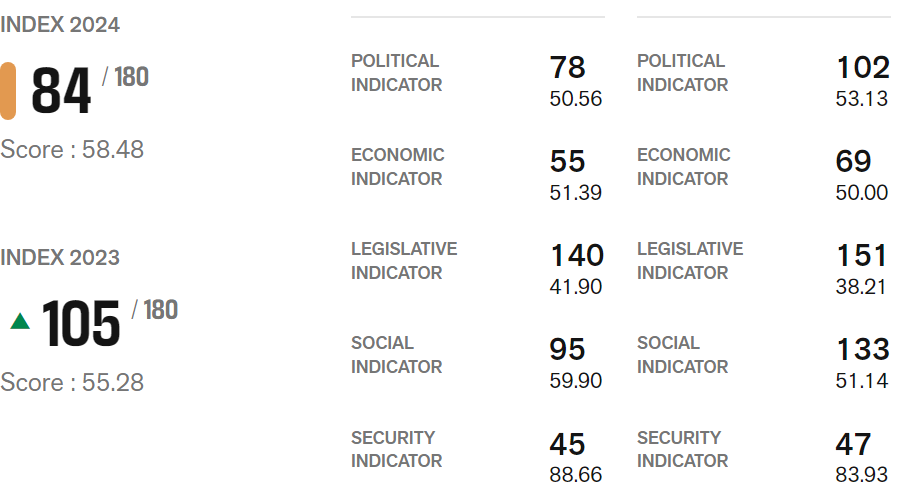
Bertelsmann Stiftung’s Transformation Index analyses the transformation processes toward democracy in transitional economies across the globe. In 2024 it was stated that throughout MENA, “autocratic rule festers” and that MENA’s scores for democracy and the quality of governance are at “all-time lows” and that “the quality of governance is deteriorating, and military forces are gaining power.” The German Non-governmental organisation adds that many countries within this region on “flashy imagery and marketing under the banner of modernisation, rather than making actual progress (BTI, 2024).
Qatar’s 2024 BTI scores
Expand Chart →
Qatar’s 2024 BTI matrix:
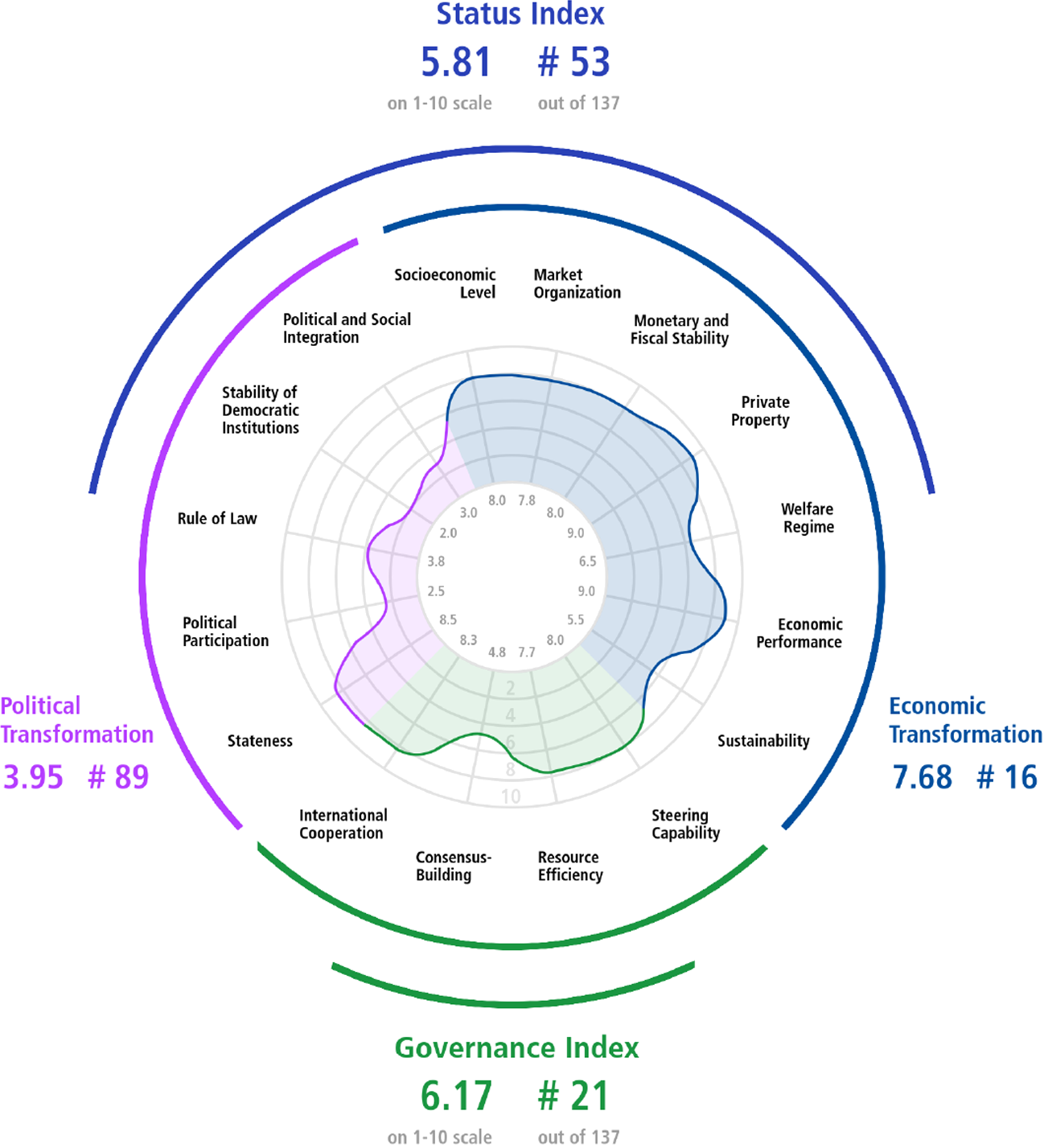
Qatar’s 2022 BTI matrix:
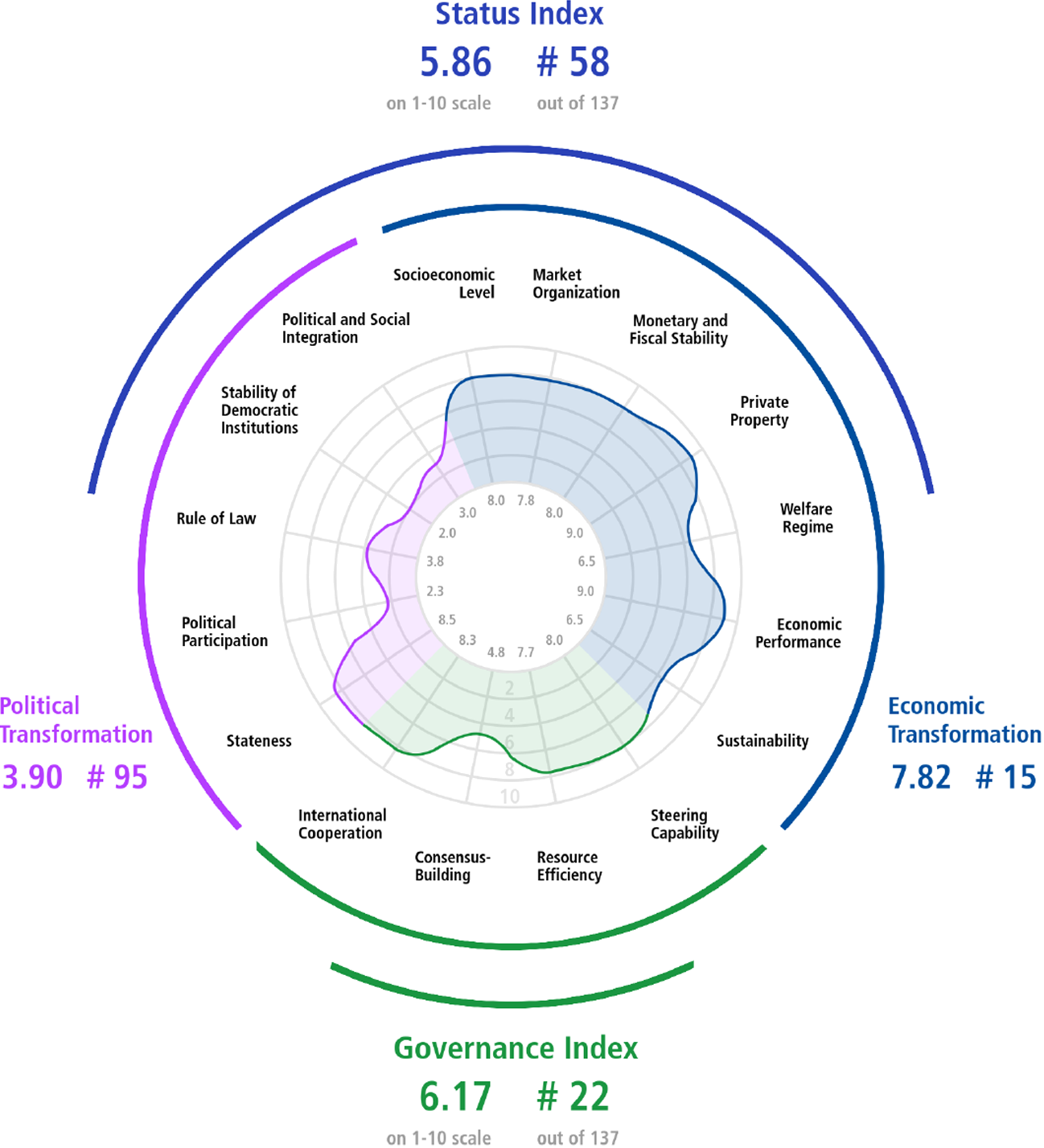
Qatar’s 2020 BTI matrix:
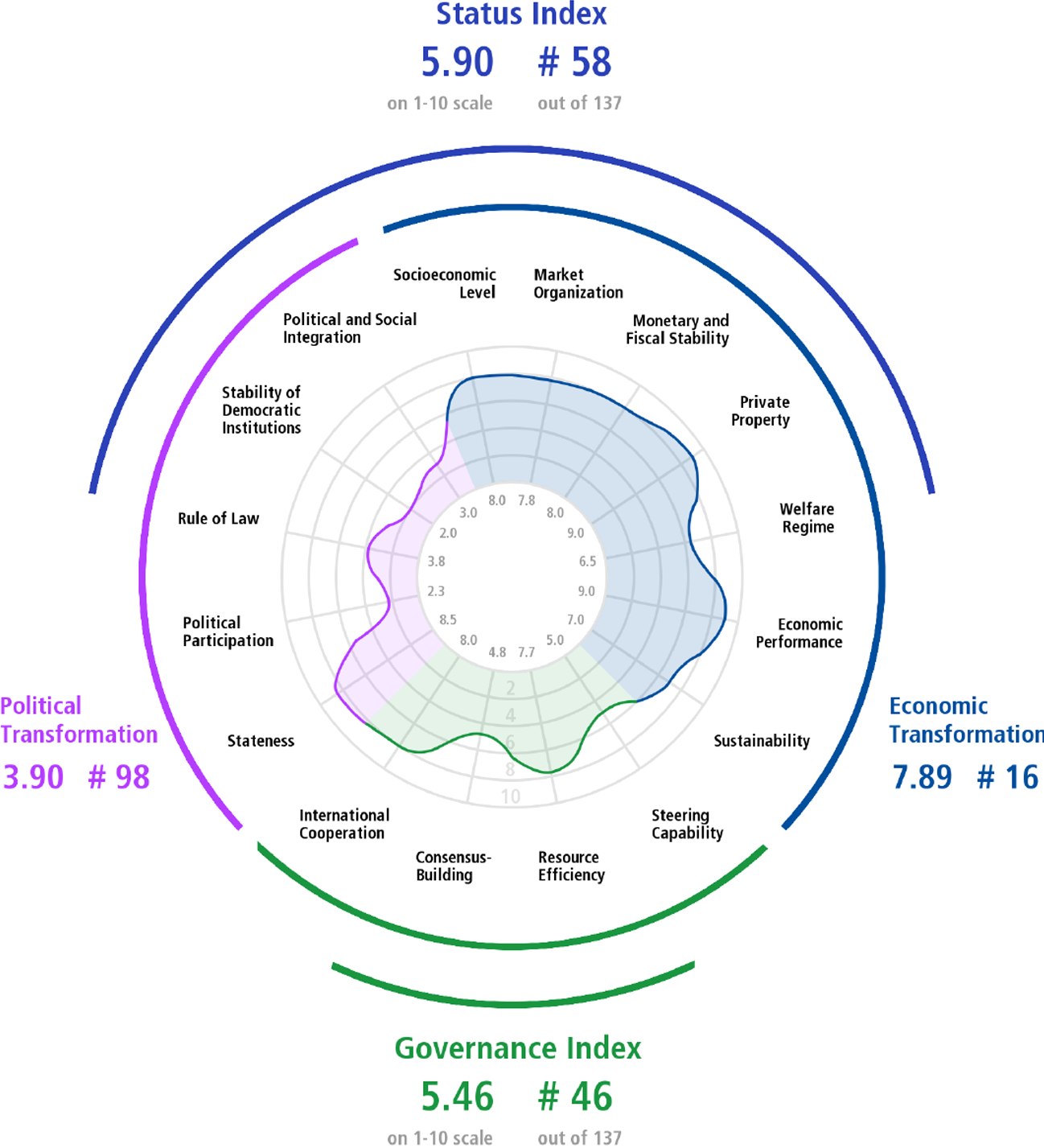
Qatar’s 2018 BTI matrix:
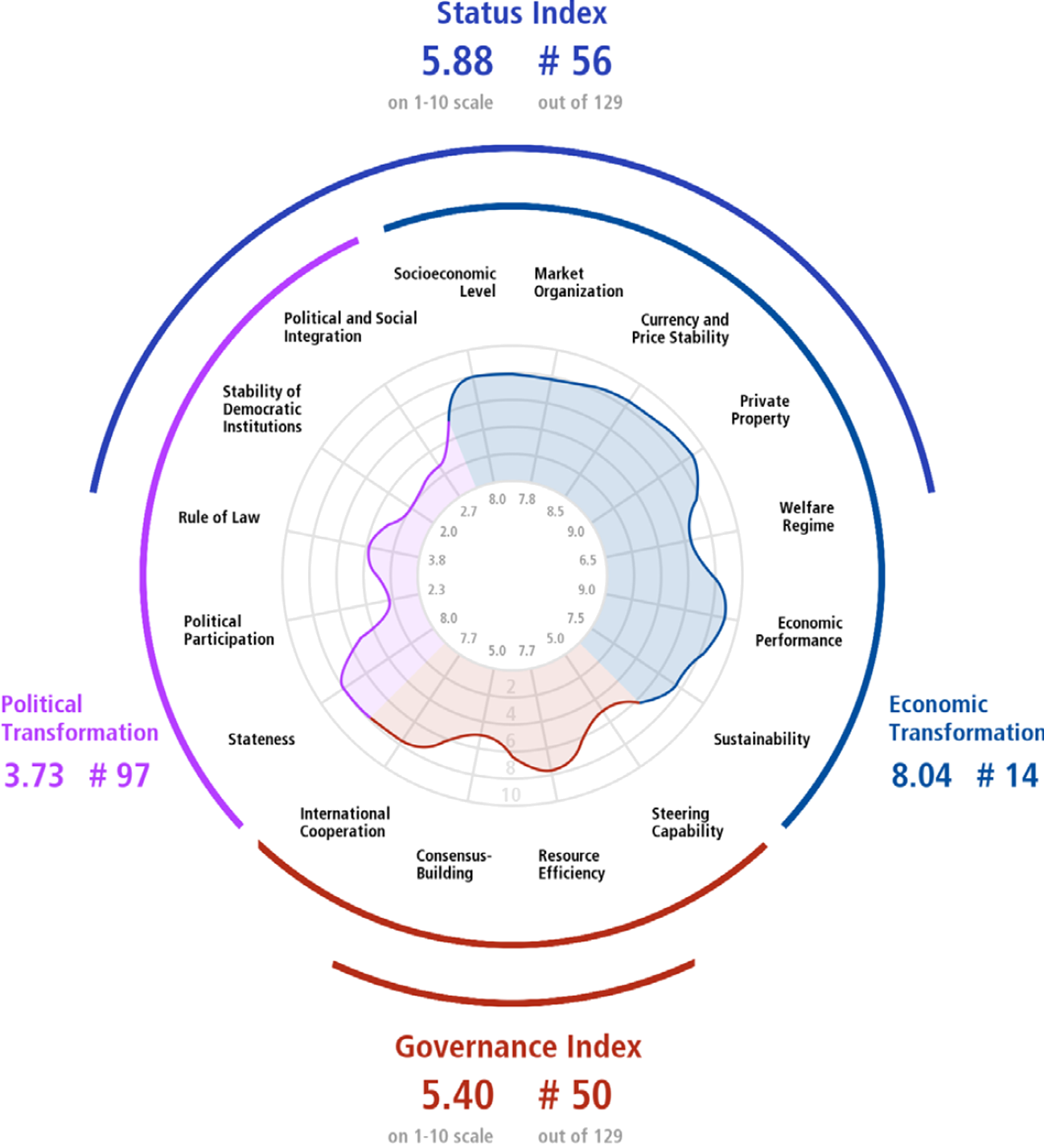
Fraser Institute rankings
The Fraser Institute’s Human Freedom Index presents a broad measure of human freedom, understood as the absence of coercive constraint.
Qatar, Human Freedom Index, 2024 scores
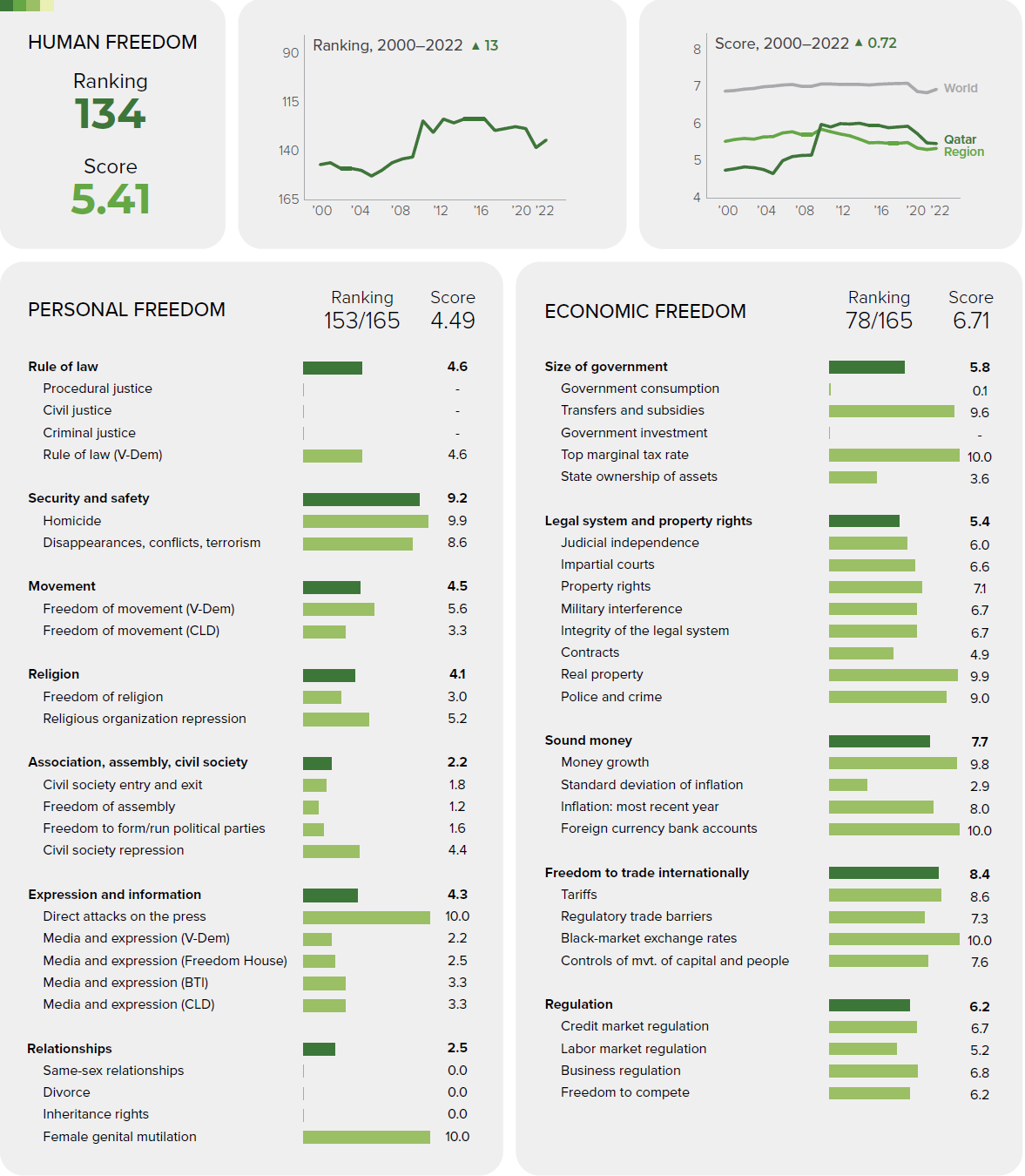
Freedom House rankings
Freedom House point out that their Freedom in the World annual rankings are “the most widely read and cited report of its kind, tracking global trends in political rights and civil liberties for over 50 years.” They chart Global Freedom scores and Internet Freedom scores for some 210 countries and territories. More latterly, Freedom House have begun to chart Internet Freedom scores (currently 70 countries are tracked, of which three are in the Arabian Gulf: Bahrain, Saudi Arabia and the United Arab Emirates).
Qatar, Freedom in the World, 2024 scores
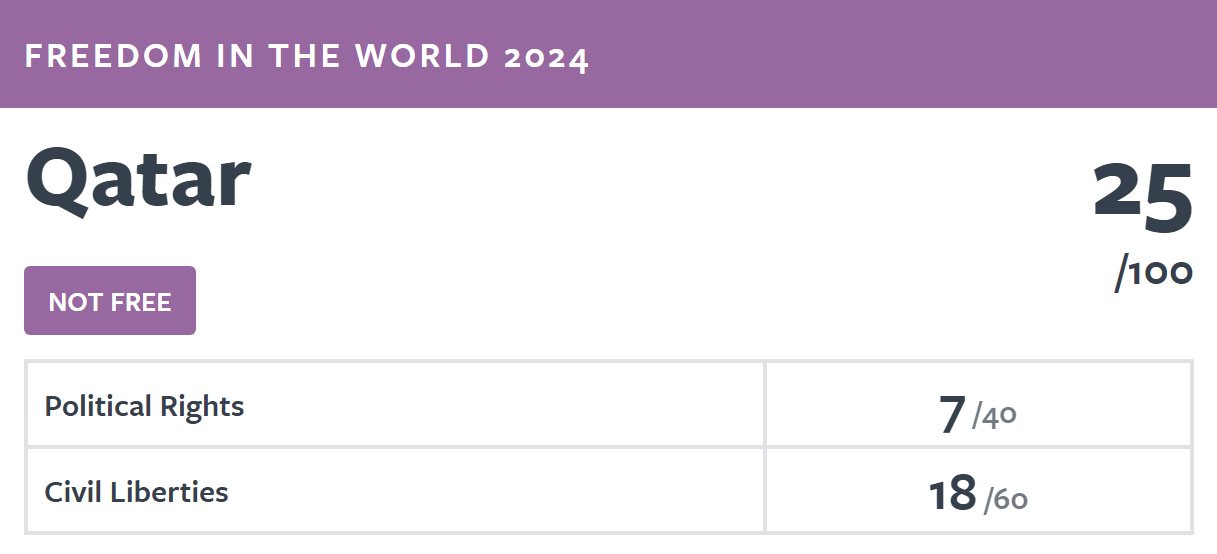
notes
Country profile information is compiled from, amongst others, the following sources; a full References list for this page is also given below:
Academic
 Cambridge University Press →
Cambridge University Press →
 Intellect Discover →
Intellect Discover →
 Oxford Academic →
Oxford Academic →
 Routledge →
Routledge →
 Sage →
Sage →
 Springer →
Springer →
Media outlets
 The Economist Intelligence Unit →
The Economist Intelligence Unit →
 Financial Times →
Financial Times →
 Middle East Economic Digest →
Middle East Economic Digest →
Organisations
 Arab Monetary Fund →
Arab Monetary Fund →
 Bertelsmann Transformation Index →
Bertelsmann Transformation Index →
 Energy Information Agency →
Energy Information Agency →
 Energy Institute →
Energy Institute →
 Eurostat →
Eurostat →
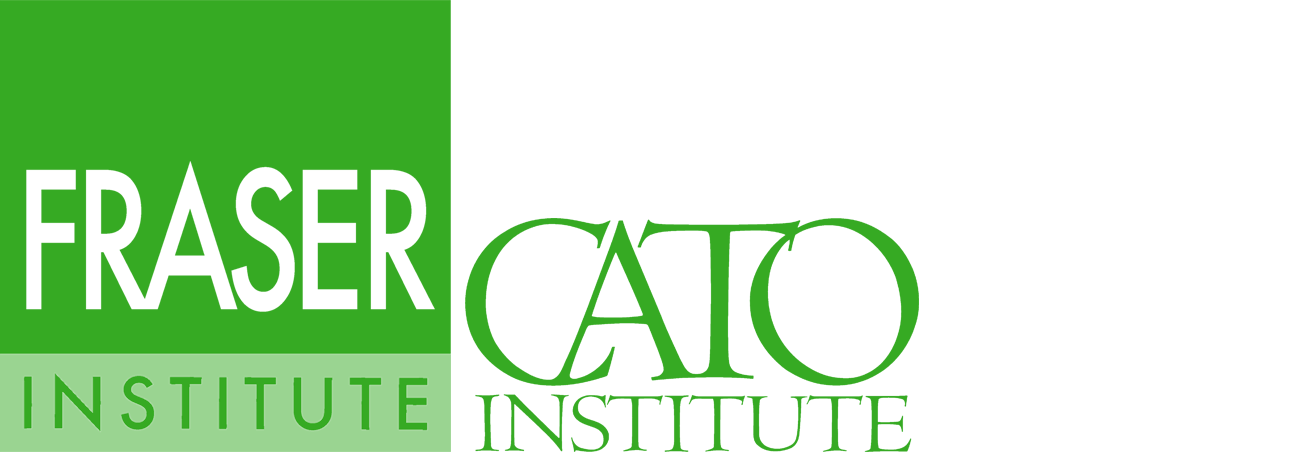 Fraser Institute →
Fraser Institute →
 Freedom House →
Freedom House →
 International Energy Agency →
International Energy Agency →
 International Monetary Fund →
International Monetary Fund →
 Organisation of Petroleum Exporting Countries →
Organisation of Petroleum Exporting Countries →
 Organisation for Economic Co-operation and Development →
Organisation for Economic Co-operation and Development →
 Reporters sans frontières →
Reporters sans frontières →
 United Nations Development Program →
United Nations Development Program →
 Varieties of Democracy →
Varieties of Democracy →
 The World Bank →
The World Bank →
 World Economic Forum →
World Economic Forum →
 World Intellectual Property Organisation →
World Intellectual Property Organisation →
 World Trade Organisation →
World Trade Organisation →
References
Al Shouk, A. (2024, June 20). Emiratisation deadline looms as larger private companies look to fulfil national targets. The National. https://www.thenationalnews.com/news/uae/2024/06/20/emiratisation-deadline-july/
Arab Monetary Fund. (2025). Economic Statistics [Dataset]. https://www.amf.org.ae/en/arabic_economic_database
Asker, J., Collard-Wexler, A., & De Loecker, J. (2017). Market power, production (mis)allocation and OPEC. National Bureau of Economic Research, Working Paper Series, 1(September, w23801), 1–54. https://doi.org/10.3386/w23801
Assidmi, L. M., & Wolgamuth, E. (2017). Uncovering the Dynamics of the Saudi Youth Unemployment Crisis. Systemic practice and action research, 30(2), 173–186. https://doi.org/10.1007/s11213-016-9389-0
Baumeister, C., & Kilian, L. (2016). Forty Years of Oil Price Fluctuations: Why the Price of Oil May Still Surprise Us. The Journal of Economic Perspectives, 30(1), 139–160. https://doi.org/10.1257/jep.30.1.139
Bekhradnia, B. (2016). International university rankings: For good or ill? Higher Education Policy Institute, 1(89), 1–32.
Benítez-Márquez, M.-D., Sánchez-Teba, E. M., Coronado-Maldonado, I., & Sung, W.-W. (2022). An alternative index to the global competitiveness index. PloS one, 17(3), 1–19. https://doi.org/10.1371/journal.pone.0265045
Bertelsmann Stiftung. (2024). BTI 2004-2024 Country Reports [Dataset: Bertelsmann Transformation Index]. https://bti-project.org/en/reports/global-dashboard
BP. (2022). Statistical Review of World Energy. British Petroleum.
Bradshaw, T. (2022). [Book Review] Davidson, C. “From Sheikhs to Sultanism: Statecraft and Authority in Saudi Arabia and the UAE”. Middle Eastern Studies, 58(1), 687–688. https://doi.org/10.1080/00263206.2021.2017288
Caldara, D., Cavallo, M., & Iacoviello, M. (2019). Oil price elasticities and oil price fluctuations. Journal of Monetary Economics, 103(May), 1–20. https://doi.org/10.1016/j.jmoneco.2018.08.004
Chirikov, I. (2023). Does conflict of interest distort global university rankings? Higher Education, 86(4), 791–808. https://doi.org/10.1007/s10734-022-00942-5
Cooley, A., & Snyder, J. (Eds.). (2015). Ranking the World: Grading States as a Tool of Global Governance. Cambridge University Press.
Cortés, P., Kasoolu, S., & Pan, C. (2023). Labor Market Nationalization Policies and Exporting Firm Outcomes: Evidence from Saudi Arabia. Economic development and cultural change, 71(4), 1397–1426. https://doi.org/10.1086/719835
EIA. (2024). International, Petroleum and other liquids [Dataset: U.S. Energy Information Administration]. https://www.eia.gov/international/data/
EIA. (2025). Real Petroleum Prices [Dataset: Energy Information Agency]. https://www.eia.gov/outlooks/steo/realprices/
EIU. (2024). Democracy Index 2023: Age of conflict. Economist Intelligence Unit. https://www.eiu.com/n/campaigns/democracy-index-2023/
EIU. (2025). EIU Democracy Indices, 2018-2023 [Dataset: EIU Democracy Indices]. Economist Intelligence Unit.
Energy Institute. (2024). Statistical Review of World Energy [Dataset]. https://www.energyinst.org/statistical-review/resources-and-data-downloads
Eurostat. (2025). Database [Dataset]. https://ec.europa.eu/eurostat/data/database
Fraser Institute. (2024). The Human Freedom Index. The Fraser Institute.
Freedom House. (2024a). Freedom on the Net [Dataset]. https://freedomhouse.org/countries/freedom-net/scores
Freedom House. (2024b). World Freedom Index [Dataset]. https://freedomhouse.org/report/freedom-world#Data
Global Media Insight. (2024). UAE Population 2024 (Key Statistics). Global Media Insight. https://www.globalmediainsight.com/blog/uae-population-statistics/
Global SWF. (2024). Countries Ranking [Dataset]. https://globalswf.com/countries
Government of Bahrain. (2024). The National Labour Market Plan 2023-2026. Labour Market Regulatory Authority.
Government of Bahrain. (2025). Open Data Portal [Dataset]. Information & eGovernment Authority. https://www.data.gov.bh/
Government of Dubai. (2022). Number of Population Estimated by Nationality [Dataset]. https://www.dsc.gov.ae/en-us/Themes/Pages/Population-and-Vital-Statistics.aspx?Theme=42
Government of Kuwait. (2018). Decent Work: Country Programme For Kuwait. Government of Kuwait.
Government of Kuwait. (2024). Labour Market Statistics [Dataset: Central Statistical Bureau]. https://www.csb.gov.kw/Pages/Statistics_en?ID=64&ParentCatID=1
Government of Kuwait. (2025). Open Data [Dataset]. https://e.gov.kw/sites/kgoenglish/Pages/OtherTopics/OpenData.aspx
Government of Oman. (2022). Skills needs in the Oman labour market: An employer survey. Oman Chamber of Commerce and Industry.
Government of Oman. (2025). Population statistics [Dataset: National Centre For Statistics & Information]. https://data.gov.om/
Government of Qatar. (2025). Open Data Portal [Dataset: Planning and Statistics Authority]. https://www.data.gov.qa
Government of Saudi Arabia. (2024). Labour Market Statistics [Dataset: General Authority for Statistics]. https://www.stats.gov.sa/en/814
Government of the United Arab Emirates. (2025). Open Data [Dataset]. Ministry of Economy. https://www.moec.gov.ae/en/open-data
Gulf Research Centre. (2024). Gulf Labour Markets, Migration and Population programme [Dataset]. https://gulfmigration.grc.net/
Gunitsky, S. (2015, June 23). How do you measure ‘democracy’? The Washington Post. https://www.washingtonpost.com/news/monkey-cage/wp/2015/06/23/how-do-you-measure-democracy/
Hazelkorn, E. (2019). University Rankings: there is room for error and “malpractice”. Elephant in the Lab. https://doi.org/10.5281/zenodo.2592196
Herre, B. (2024). Democracy data: how sources differ and when to use which one. OurWorldinData.org. https://ourworldindata.org/democracies-measurement
Hertog, S. (2018). Can we Saudize the labour market without damaging the private sector? Retrieved from http://eprints.lse.ac.uk/id/eprint/101471
Hertog, S. (2024). The Political Economy of Reforms under Vision 2030. In J. Sfakianakis (Ed.), The Economy of Saudi Arabia in the 21st Century: Prospects and Realities (pp. 359–380). Oxford University Press.
IEA. (2025). Data and statistics [Dataset: The International Energy Agency]. https://www.iea.org/data-and-statistics/data-sets
Ikenberry, G. J. (2015). Ranking the World: Grading States as a Tool of Global Governance [Book Review]. Foreign Affairs, 94(5), 180–180. https://www.jstor.org/stable/24483753
IMF. (2023). Kuwait: 2023 Article IV Consultation. IMF Staff Country Reports, 2023(331). https://doi.org/10.5089/9798400254680.002
IMF. (2024a). Gulf Cooperation Council: Pursuing Visions Amid Geopolitical Turbulence. International Monetary Fund working papers, 2024(66), 1–74. https://doi.org/10.5089/9798400295744.007
IMF. (2024b). Qatar: 2023 Article IV Consultation. IMF Country Report, 2024(24/43). https://www.imf.org/en/Publications/CR/Issues/2024/02/06/Qatar-2023-Article-IV-Consultation-Press-Release-and-Staff-Report-544471
IMF. (2024c). Saudi Arabia: 2024 Article IV Consultation. IMF Staff Country Reports, 2024(323). https://doi.org/10.5089/9798400252099.002
IMF. (2024d). United Arab Emirates: 2024 Article IV Consultation. IMF Staff Country Reports, 2024(325). https://doi.org/10.5089/9798400293245.002
IMF. (2024e). World Economic Outlook [Dataset]. https://www.imf.org/en/Publications/WEO/weo-database/2024/April
IMF. (2025). Oman: 2024 Article IV Consultation. IMF Staff Country Reports, 2025(13). https://doi.org/10.5089/9798400298318.002
Kashyap, A. K., & Kovrijnykh, N. (2016). Who Should Pay for Credit Ratings and How? The Review of financial studies, 29(2), 420–456. https://doi.org/10.1093/rfs/hhv127
Lopesciolo, M., Muhaj, D., & Pan, C. (2021). The quest for increased Saudization: Labor market outcomes and the shadow price of workforce nationalisation policies. Retrieved from https://growthlab.hks.harvard.edu/publications/quest-increased-saudization-labor-market-outcomes-and-shadow-price-workforce
Nair, D. (2024, May 13). What roles are Emiratis being hired for in the private sector? The National. https://www.thenationalnews.com/business/money/2024/05/13/emiratis-hired/
OECD. (2025). OECD Data Explorer [Dataset]. https://www.oecd.org/en/data/datasets/oecd-DE.html
OPEC. (2024). Annual Statistical Bulletin. Organisation of the Petroleum Exporting Countries.
Polity IV. (2018). Political Regime Characteristics and Transitions, 1800–2018 [Dataset: Center for Systemic Peace]. http://www.systemicpeace.org/inscr/p4v2018.xls
Poplavskaya, A., Karabchuk, T., & Shomotova, A. (2023). Unemployment Challenge and Labor Market Participation of Arab Gulf Youth: A Case Study of the UAE. In M. M. Rahman & A. Al-Azm (Eds.), Social Change in the Gulf Region: Multidisciplinary Perspectives (pp. 511–529). Springer Nature Singapore.
Porter, M. E. (1998). Competitive Advantage of Nations. Simon & Schuster.
Reporters Without Borders. (2024). Press Freedom Index [Dataset: Press Freedom Index]. https://rsf.org/en/index
Rutledge, E. J., & Al Kaabi, K. (2023). ‘Private sector’ Emiratisation: social stigma’s impact on continuance intentions. Human Resource Development International, 26(5), 603–626. https://10.1080/13678868.2023.2182097
Shore, C. (2018). How Corrupt Are Universities? Audit Culture, Fraud Prevention, and the Big Four Accountancy Firms. Current Anthropology, 59(18), 92–104. https://doi.org/10.1086/695833
The Economist. (2020, May 7). Credit-rating agencies are back under the spotlight. The Economist. Retrieved from https://www.economist.com/finance-and-economics/2020/05/07/credit-rating-agencies-are-back-under-the-spotlight
The Times of Kuwait. (2024, August 24). Kuwaiti workforce grows to 457,567. The Times of Kuwait. https://timeskuwait.com/kuwaiti-workforce-grows-to-457567-makes-up-21-3-of-labor-market/
UNDP. (2024). Human Development Index [Dataset: The United Nations Development Program]. https://hdr.undp.org/data-center
UNDP. (2025). Human Development Index (HDI). The United Nations Development Program. https://hdr.undp.org/data-center/human-development-index#/indicies/HDI
V-Dem. (2024). V-Dem [Dataset: University of Gothenburg, Department of Political Science]. https://doi.org/10.23696/mcwt-fr58
Vaccaro, A. (2021). Comparing measures of democracy: statistical properties, convergence, and interchangeability. European political science, 20(4), 666–684. https://doi.org/10.1057/s41304-021-00328-8
WEF. (2019). The Global Competitiveness Indices. The World Economic Forum. https://www3.weforum.org/docs/WEF_TheGlobalCompetitivenessReport2019.pdf
WEF. (2025). The Global Competitiveness Indices, 2008–2019 [Dataset: Global Competitiveness Indices]. The World Economic Forum. https://www.weforum.org/publications/series/
WIPO. (2024). Global Innovation Index [Dataset: UN, The World Intellectual Property Organisation]. https://www.wipo.int/en/web/global-innovation-index
World Bank. (2024a). Macro Poverty Outlook [Dataset]. http://documents.worldbank.org/curated/en/099345310142441749/
World Bank. (2024b). Worldwide Governance Indicators [Dataset]. https://www.worldbank.org/content/dam/sites/govindicators/
World Bank. (2025a). World Development Indicators [Dataset]. https://data.worldbank.org/
World Bank. (2025b). Worldwide Governance Indicators – Data Sources. https://www.worldbank.org/en/publication/worldwide-governance-indicators/
WTO. (2025). WTO Stats [Dataset: World Trade Organisation]. https://stats.wto.org/dashboard/merchandise_en.html
The Six GCC Economies:
 |
 |
 |
 |
 |
 |
| i | This is the website of Dr Emilie J. Rutledge who, with almost two decades’ worth of experience in managing, designing and delivering university-level economics courses, is currently Head of the Economics Department at The Open University.
 erutledge.com  Dr Emilie J. Rutledge Emilie has published over 20 peer-reviewed papers and is the author of “Monetary Union in the Gulf.” Her current research focus is on employability, the feasibility of universal basic incomes and, the oil-rich Arabian Gulf’s economic diversification and labour market reform strategies. On an ad hoc basis, Emilie provides consultancy on developing interactive university courses, alongside analytical insight on the political-economy of the Arabian Gulf. |

 Elsevier
Elsevier